The Future of Preventative Health with AI
Imagine a world where technology spots health risks before symptoms appear. That’s no longer a dream—artificial intelligence is reshaping healthcare by turning prevention into a precise science. Systems now handle tasks like booking appointments and tracking medical records, but their potential runs deeper. They analyze patterns in data to warn about drug interactions or suggest personalized care plans, acting as tireless partners for doctors and patients alike.
Preventative care thrives on early action, and intelligent tools are perfect for this. Algorithms process genetic info, lifestyle habits, and lab results to predict risks like heart disease or diabetes. This isn’t just automation—it’s proactive medicine. Clinics using these systems report fewer errors and faster diagnoses, freeing up time for meaningful patient interactions.
The healthcare industry stands at a turning point. With AI-driven insights, providers can shift from treating illnesses to stopping them. From reminding patients about checkups to optimizing treatment plans, technology bridges gaps in accessibility and accuracy. This isn’t about replacing humans—it’s about empowering them to focus on what matters most: keeping people healthy.
Key Takeaways
- AI transforms prevention by identifying risks earlier than traditional methods.
- Intelligent systems reduce medical errors through data-driven recommendations.
- Personalized health insights improve patient engagement and outcomes.
- Automation streamlines tasks like scheduling and record management.
- Proactive care models could lower long-term healthcare costs.
Innovative Transformations in Preventative Health Assessments
Health checkups are getting smarter than ever. New tools analyze bloodwork, genetic profiles, and lifestyle factors simultaneously, spotting risks months before traditional methods. This shift helps healthcare providers create tailored prevention plans instead of generic advice.
Revolutionizing Health Assessments with AI
Virtual health assistants now explain lab results in plain language. They flag medication conflicts and suggest dosage adjustments. At Echelon Health, deep learning systems cut CT scan radiation by 45% while improving image clarity. Patients spend less time in machines yet get more precise diagnosis.
These systems detect hidden patterns in cholesterol levels or blood sugar trends. One clinic reported catching prediabetes cases 30% earlier using AI-driven assessments. Doctors gain extra time to discuss prevention strategies rather than crunch numbers.
Advancements in Medical Imaging and Diagnostics
The AiCE imaging system shows how artificial intelligence transforms scans. Its reconstruction method produces crystal-clear images in half the time. Radiologists spot tumors and blockages faster, reducing patient anxiety during wait times.
Machine learning also minimizes false positives in mammograms and lung screenings. Early trials show 22% fewer unnecessary biopsies. As healthcare evolves, these tools help teams focus on personalized care instead of chasing ambiguous results.
The Role of AI in the Future of Preventative Health
Medical records often resemble puzzle pieces scattered across clinics. About 90% of patient information lives in messy formats like handwritten notes or disconnected lab reports. This fragmentation makes holistic care challenging. Here’s where smart systems step in—transforming jumbled data into clear roadmaps for prevention.

Enhancing Clinical Decision-Making and Accuracy
Modern tools scan mountains of healthcare records faster than human teams. They spot medication conflicts in prescriptions or unusual lab trends needing follow-up. At Boston General Hospital, these systems reduced diagnostic errors by 18% last year. Doctors now spend 40% less time hunting for test results.
Natural language processing digs through physician notes and research papers. It flags genetic risks hidden in family histories or environmental factors affecting treatment plans. One algorithm recently identified 200+ patients at risk for kidney disease six months earlier than traditional methods.
Integrating Unstructured Data for Better Outcomes
Machine learning connects dots between sleep patterns, pharmacy refills, and ER visits. This creates complete patient profiles instead of snapshots. Clinicians using integrated systems report:
- 28% faster identification of chronic disease markers
- 35% improvement in personalized prevention strategies
- 19% higher patient adherence to care plans
These insights help providers make smarter decisions. Instead of guessing which screening to order next, they get data-backed recommendations. The result? Fewer missed opportunities for early intervention and better long-term outcomes across communities.
Personalized Risk Profiles and Data-Driven Interventions
Your DNA isn’t the whole story. Modern prevention combines genetic blueprints with daily habits, environmental factors, and decades of medical health records. This fusion creates living risk profiles that evolve with you.
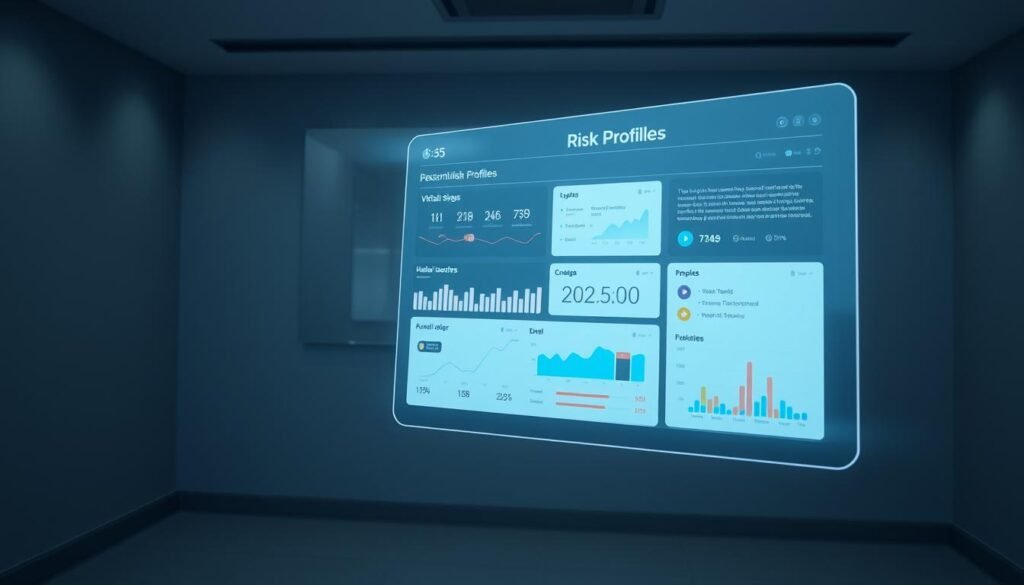
Tailoring Health Assessments Based on Individual Data
Imagine getting flu shot reminders timed to your travel plans. Clinics now use electronic health records paired with wearable tech to spot patterns. One system flagged 112 patients for early diabetes screening last month based on sleep data and glucose trends.
These tools digest complex data streams:
- Genetic markers for cancer susceptibility
- Real-time heart rate variability from smartwatches
- Local air quality impacting asthma risks
Utilizing Electronic Health Records and Wearable Tech
Your fitness tracker just became a prevention partner. When synced with electronic health systems, it alerts providers about concerning trends. A Midwest hospital reduced ER visits by 14% using this approach for high-risk patients.
Doctors receive dashboards showing:
- Medication adherence through pharmacy records
- Biometric changes needing intervention
- Customized screening schedules
This game-changer shifts healthcare from guessing games to precision. By connecting dots across data sources, care teams stop problems before they start.
Early Detection and Proactive Interventions in Healthcare
Silent health threats meet their match through advanced screening tools. Modern systems now spot microscopic changes invisible to human eyes, transforming how we approach cancer and chronic conditions.
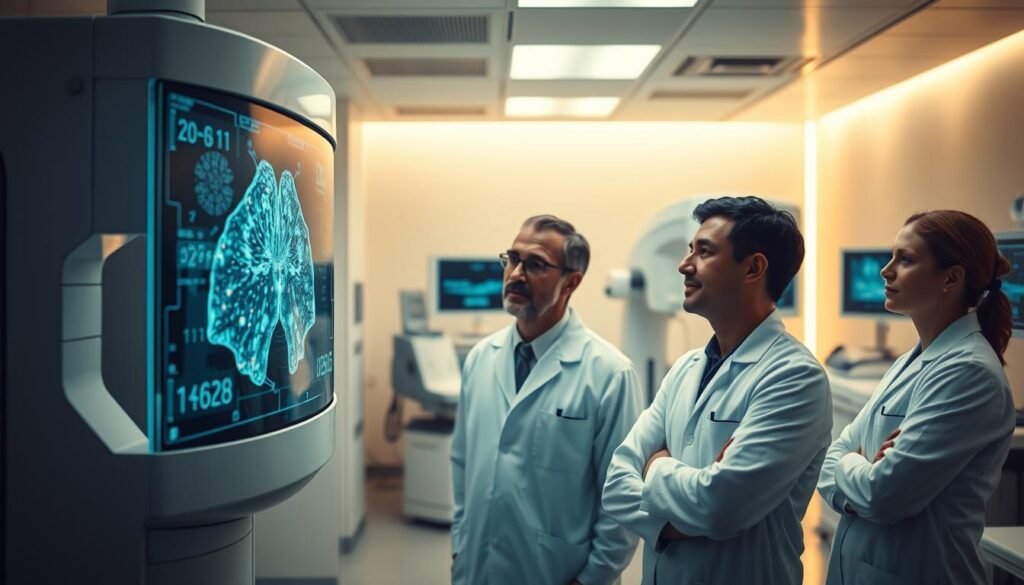
Precision in Imaging Analysis
Mammogram reviews once relied solely on radiologist expertise. Now, machine learning models trained on millions of scans detect tumors 15% smaller than traditional methods. At Mayo Clinic, these systems reduced false positives by 27% last year.
“Our AI spotted left ventricular dysfunction in 94% of asymptomatic patients during routine checkups.”
Predictive Power in Chronic Care
Kidney disease monitoring illustrates this shift. Where manual calculations took 45 minutes per case, algorithms now analyze 3D organ scans in 8 seconds. This speed allows monthly tracking instead of annual checks for high-risk groups.
| Method | Time per Analysis | Early Detection Rate |
|---|---|---|
| Traditional Screening | 45 minutes | 68% |
| AI-Assisted System | 8 seconds | 89% |
These advances create ripple effects across healthcare. Faster diagnosis means earlier treatment starts – critical for improving survival rates in breast cancer and heart disease. Clinics using predictive tools report 22% fewer emergency admissions among chronic patients.
Leveraging AI for Continuous Monitoring and Real-Time Feedback
Smartwatches now do more than count steps—they’re frontline health guardians. Advanced sensors track heart rhythms, blood oxygen levels, and even stress indicators 24/7. This always-on monitoring creates safety nets for people with chronic conditions and busy professionals alike.
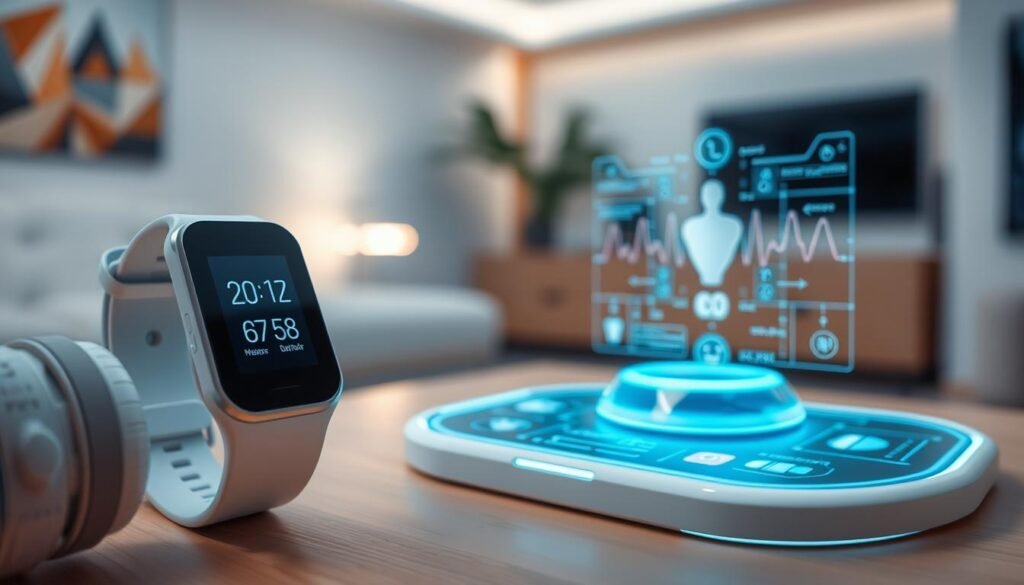
Utilizing Wearable Devices and IoT in Health
Modern wearables collect data once only measurable in clinics. A fitness band can now detect irregular heartbeats while syncing glucose readings with insulin pumps. IoT-enabled scales share weight trends with care teams, creating connected ecosystems for healthcare management.
These devices track:
- Sleep quality through movement and breathing patterns
- Blood pressure changes during daily activities
- Fall detection using motion sensors
At Stanford Hospital, IoT integration reduced ER visits by 19% last year. Patients received medication reminders when systems spotted skipped doses through smart pillboxes.
Immediate Alerts and Adaptive Health Strategies
Real-time alerts transform prevention into action. A vibrating wrist warning for spiking blood sugar lets users adjust meals instantly. Care teams get notified if monitoring detects stroke-risk blood pressure levels overnight.
Machine learning adapts recommendations based on data trends. After detecting poor sleep patterns, systems might suggest earlier bedtimes or stress-reduction exercises. This feedback loop keeps health plans relevant as lifestyles change.
One diabetes study showed 32% fewer emergencies when patients used AI-driven glucose monitoring. The technology doesn’t just watch—it actively guides better health decisions every hour of the day.
Challenges, Ethical Considerations, and Data Privacy in AI-Driven Health
While smart systems revolutionize prevention, they bring complex challenges needing urgent solutions. Protecting sensitive healthcare information tops the list—algorithms require mountains of personal data, raising valid privacy concerns. Breaches could expose genetic details or treatment histories, making robust encryption and strict access controls non-negotiable.
Addressing Data Fragmentation and Privacy Concerns
Scattered records across clinics create security gaps and care delays. Unified systems must merge data from wearables, labs, and EHRs without compromising safety. Providers using encrypted platforms report 40% fewer breaches while improving care coordination for patients.
Over-reliance on machine intelligence poses ethical risks. Tools might miss cultural nuances in healthcare decisions or misinterpret rare conditions. Human oversight ensures algorithms support rather than dictate care plans. As one Boston clinic found, combining AI alerts with doctor reviews cut misdiagnoses by 31%.
Transparency builds trust. Patients deserve clear explanations about how their information gets used. Regular audits and consent protocols help balance innovation with individual rights—a critical step toward ethical AI adoption in modern medicine.
FAQ
How does AI improve accuracy in preventative health assessments?
AI analyzes patterns in electronic health records and wearable tech data to identify risks early. Machine learning algorithms detect subtle changes in patient information, helping clinicians make precise decisions. This reduces errors and enhances diagnostic accuracy for conditions like cancer or heart disease.
Can AI integrate unstructured data for better healthcare outcomes?
Yes! Tools like natural language processing extract insights from doctor’s notes, imaging reports, or patient feedback. This unstructured data, combined with structured records, creates a fuller picture of health. Providers can then personalize treatment plans and predict potential issues before they escalate.
What role do wearable devices play in AI-driven health monitoring?
Wearables like Fitbit or Apple Watch collect real-time data on heart rate, activity, and sleep. AI processes this information to offer immediate feedback, such as alerting users about irregular rhythms. Continuous monitoring helps adapt health strategies, improving long-term outcomes through proactive care.
How does AI address privacy concerns in healthcare data?
Advanced encryption and anonymization techniques protect patient information. Companies like IBM Watson Health use secure platforms to ensure data isn’t misused. While challenges like fragmentation exist, strict compliance with regulations like HIPAA maintains trust in AI-driven systems.
Can AI reduce costs in preventative healthcare?
Absolutely. By catching diseases early, AI lowers expensive treatments later. For example, algorithms analyzing mammograms reduce false positives in cancer screening. This streamlines workflows, saves time for providers, and cuts unnecessary costs for patients and insurers alike.
How does machine learning improve cancer diagnosis accuracy?
Algorithms trained on millions of medical images spot tumors faster than traditional methods. Platforms like Google’s DeepMind have shown success in detecting breast cancer from scans. This speeds up diagnosis, allowing timely interventions that improve survival rates and quality of life.
Share this content:
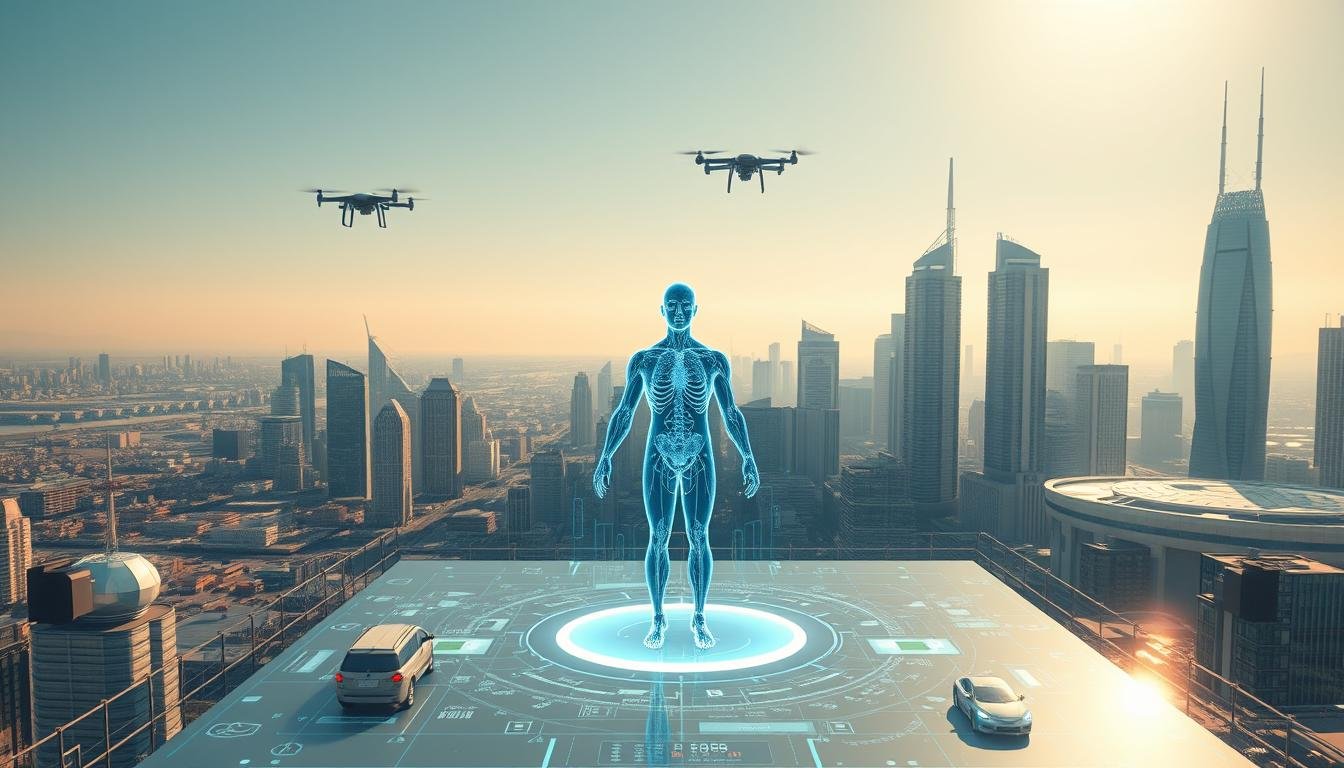
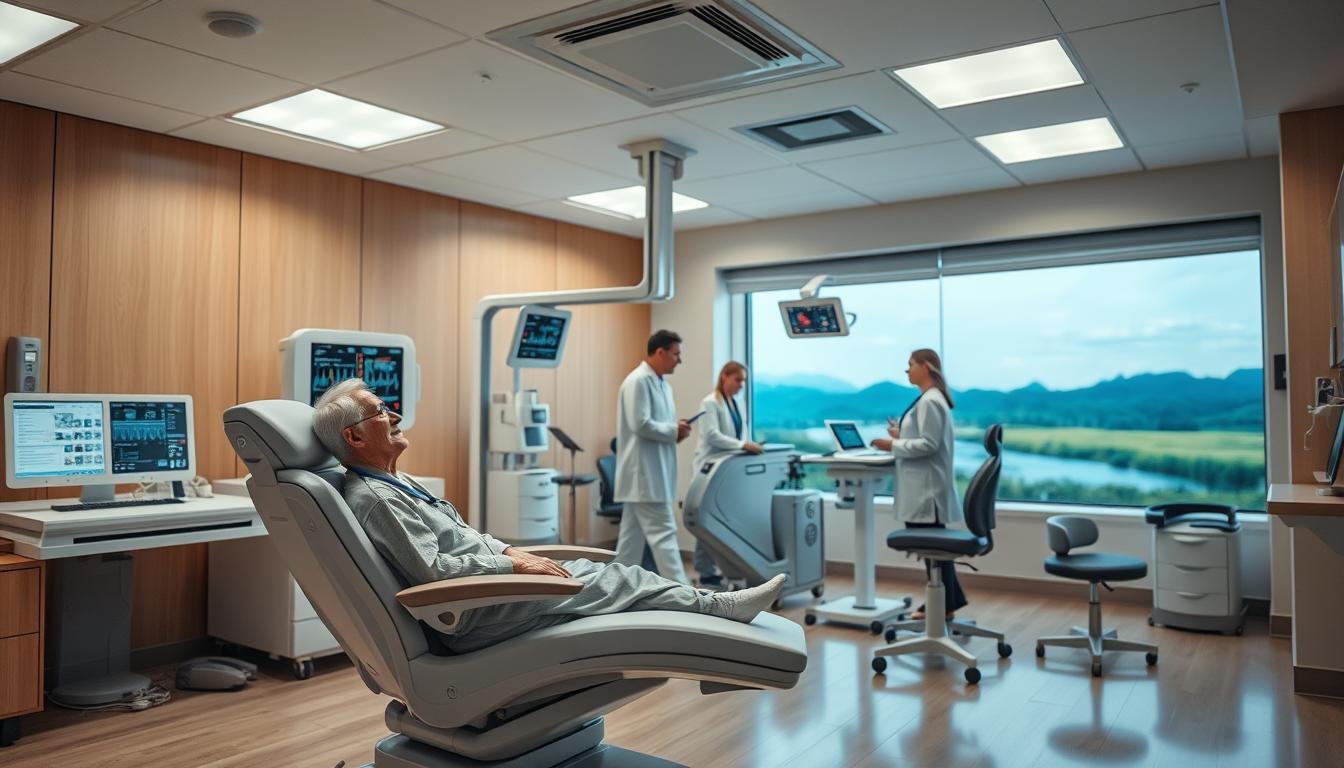
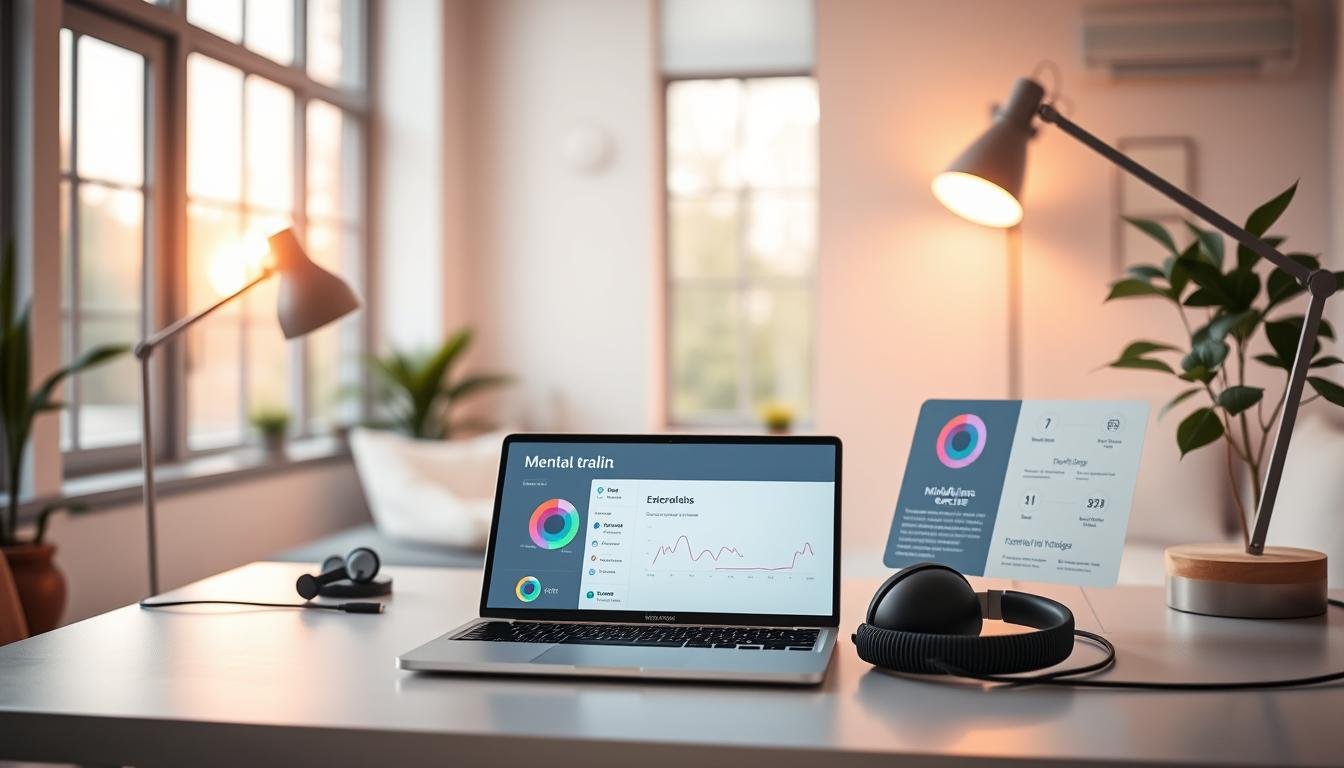

Post Comment